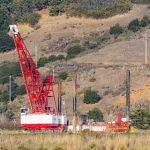Surety Bond Professionals is a family owned and operated bonding agency with over 30 years of experience. With access to a broad range of surety markets, our expert agents are ready to assist with all of your construction bond needs.
Climate Change Risks in the Construction Industry
Worldwide, the construction industry generates about half of all carbon emissions, and in the United States, about 40%. That includes the embodied carbon from the production and transportation of building materials and the operational carbon from lighting, HVAC systems. The construction industry is under intense pressure from project owners, investors, and various government entities to reduce the carbon footprint of every new structure.
The Task Force on Climate-Related Financial Disclosures (TCFD) has studied the risks associated with climate change and has categorized them as 1) physical risk or 2) transition risks, which stem from failing to take decisive action in the transition to a lower carbon economy.
Physical Risks
Climate change is also having an impact on the way construction companies design and build new structures. The increasing number and severity of weather events such as tornadoes and hurricanes, as well as chronic issues such as sea level rise, flooding, and wildfires, are disrupting supply chains, increasing the cost of building materials, and making it more difficult to complete construction projects on time.
Transition Risks
TCFD identified four different transition risks: policy and legal, market, technological, and reputational.
Policy and Legal Risks
The increase in severe weather events and climate-related issues are also causing municipalities, particularly those in vulnerable areas, to make building codes more stringent. Emissions reporting requirements are becoming stricter, as is the risk of litigation for failing to comply.
Market Risks
Customer behaviors and what they’re looking for in a structure are changing in response to climate change. Construction firms are having to pay more for materials that meet more stringent building codes and carbon reduction standards. And market uncertainties are making forecasting and estimating more difficult.
Technological Risks
New materials and products are being developed to lower greenhouse gas emissions and meet green construction requirements. Transitioning to lower emissions technology is increasing building costs.
Reputational Risks
Changing consumer preferences will dictate which construction firms are favored for green building projects. Construction companies may suffer reputational damage from stakeholders who find their carbon reduction efforts inadequate. Reputational damage and a general view of the construction industry as culpable for carbon emissions can threaten a construction company’s ability to secure financing.
Key Climate Change Challenges for The Construction Industry
In 2022, 80% of investors say that climate change is entering into their capital allocation plans. And the percentage of investors stating that climate change is a significant factor in making investment decisions jumped from 31% in 2021 to 75% in 2022. They expect the companies they invest in to disclose their climate-related metrics and accomplishments and demonstrate a strong connection between their response to climate change and their financial performance. These changing investor expectations present a challenge for project owners seeking financing for large construction projects, which ultimately impacts construction firms.
Additionally, many large, commercial project owners are publicly traded companies and will therefore be subject to a rule proposed by the SEC that is scheduled to go into effect at the end of 2023. The new rule will require companies listed on a stock exchange to disclose their physical and transition climate-related risks and their current emissions. Complying with this rule will require listed companies investing in the building sector to rely on contractors and subcontractors to furnish accurate information on embodied and operational carbon, waste generated during construction, and more.
With Challenges Come Opportunities
Another major challenge is the tightening of building codes and standards related to the mitigation of climate change. Many municipalities are following the lead of New York City and setting demanding targets for decreasing carbon emissions in both new construction and existing buildings. Older buildings will require upgrades, and landing new construction contracts will require contractors to employ green building practices.
Contractors that acquire these capabilities now will be in the best position to grow their business by retrofitting buildings with energy-efficient upgrades, putting up new buildings that meet strict environmental standards, and protecting themselves and their clients from the negative impacts of climate change. They also will be regarded favorably by the surety bond guarantors they apply to for the necessary performance bonds.
Get A Quote
Our surety bond professionals will get you the construction bonds you need at a competitive rate.





